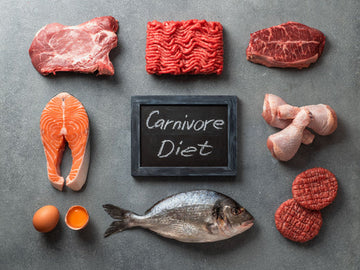The carnivore diet is polarizing: for some it is an effective way of eating that can promote health and well-being, for others it is a radical and dangerous fad. However, as this meat-based diet becomes more popular, many myths and misunderstandings arise. It is time to take a closer look at the most common prejudices and find out the truth.
Myth 1: The carnivore diet inevitably leads to nutrient deficiencies
Many people believe that a diet without fruits, vegetables or grains inevitably leads to nutritional deficiencies, as these are considered the primary source of vitamins and minerals. The truth is that animal products, especially organ meats such as liver, kidney or heart, are extremely rich in nutrients. They contain important nutrients such as vitamin B12, iron, zinc and vitamin A in high bioavailability - that is, the body can absorb them particularly well.
What might actually be missing is fiber and vitamin C. However, it is discussed that the need for vitamin C decreases with a low-carbohydrate diet, as fewer oxidative processes take place in the body. Nevertheless, it is important to observe the body carefully and make adjustments if necessary.
Myth 2: The carnivore diet increases cholesterol and causes heart disease
Because the carnivore diet contains a high proportion of animal fats, there is often concern that it will raise cholesterol levels and increase the risk of cardiovascular disease. However, recent studies and discussions show that cholesterol cannot be categorized as "bad" across the board. The ratio between HDL ("good") and LDL ("bad") cholesterol is particularly important.
Some people who follow the Carnivore Diet report stable cholesterol levels or even improvements. It is believed that the reduction of sugar and refined carbohydrates plays a positive role. However, this is an individual aspect and regular health checks are advisable.
Myth 3: The carnivore diet is bad for gut health
There is a widespread fear that cutting out fiber from fruits, vegetables and whole grains could affect gut health. Fiber is often considered essential for healthy digestion. Interestingly, however, many carnivore followers report an improvement in their digestion.
Animal products are easy to digest and the body can use them efficiently, resulting in fewer "waste products" that need to be excreted. It is also argued that inflammatory processes in the intestines could be reduced by avoiding plant-based antinutrients such as lectins or phytic acid. However, the long-term effect on intestinal health has not yet been comprehensively investigated scientifically.
Myth 4: Without carbohydrates you have no energy
A common misconception is that carbohydrates are the only or best source of energy for the body. In fact, the human body is adaptable and can get energy from fat. In the Carnivore Diet, there is a switch to a fat-burning diet that uses ketones as the main source of energy.
During the adaptation phase – the so-called “keto flu” – you may experience temporary symptoms such as fatigue or lack of energy. However, once the body is “fat adapted”, many report more stable energy levels and improved concentration.
Myth 5: The Carnivore Diet is Extremely Expensive
It is true that high-quality meat and fish often come at a price. But the carnivore diet does not automatically have to be expensive. Many people opt for inexpensive options such as minced meat, offal or bones, which are not only affordable but also particularly rich in nutrients.
As far as taste goes: meat and fish can be refined in many ways with herbs, spices or broths. Spices such as paprika, garlic, pepper or rosemary provide variety and make every meal a real pleasure.
Many carnivore followers buy in larger quantities or use cheaper cuts of meat such as minced meat or offal. The latter are not only inexpensive, but also particularly rich in nutrients. Those who value quality can also save money by buying regional meat or buying it directly from the farmer.
Myth 6: The carnivore diet is unnatural
Some critics argue that avoiding plant-based foods is unnatural, as humans are omnivores. Historically, however, meat played a central role in the diet of hunter-gatherers. Animal products provided a reliable source of calories and nutrients, while plant-based foods were often seasonal or difficult to obtain.
The carnivore diet builds on this diet and simplifies the menu to the essentials. It is not a universal solution, but it is also not an unnatural fad.
Myth 7: The carnivore diet is boring

At first glance, it may seem that the carnivore diet offers little variety. But within the world of animal foods, there is a great deal of variety. From different types of meat such as beef, pork, poultry or game to seafood, offal and broths, there are numerous options.
Preparation methods such as grilling, braising, sous-vide or frying also provide different flavors and textures. Many people also experiment with animal fats such as bone marrow or butter to create new taste experiences.
critically questioning myths
The carnivore diet is often misunderstood and accompanied by prejudices that are often based on assumptions or ignorance. Making an informed decision and understanding your own needs is therefore crucial. As with any diet, the carnivore diet is not suitable for everyone and there is no universal solution. It is a good idea to consult a doctor or nutritionist before making any major changes to your diet. Clearing up myths can be a helpful basis for anyone interested in this diet. With the right approach, the carnivore diet can offer an exciting opportunity to simplify your diet and get to know your body in a new way.





